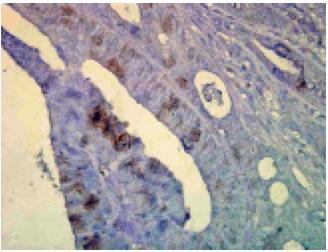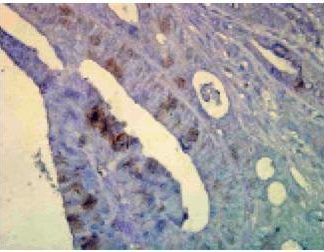Immuno Histo Chemistry -Hsp70 (160 Slides Kit)
Picture: Shows Anti-Hsp70. The human colon tissue stained (brown) mostly in inflammatory cells. Shown at a 1:100,000 dilution of SKC-240 using the ABC method.
Description:
Hsp70 genes encode abundant heat-inducible 70-kDa hsps (hsp70s). In most eukaryotes hsp70 genes exist as part of a multigene family. They are found in most cellular compartments of eukaryotes including nuclei, mitochondria, chloroplasts, the endoplasmic reticulum and the cytosol, as well as in bacteria. The genes show a high degree of conservation, having at least 5O% identity (1). The N-terminal two thirds of hsp70s are more conserved than the C-terminal third. Hsp70 binds ATP with high affinity and possesses a weak ATPase activity which can be stimulated by binding to unfolded proteins and synthetic peptides (2). When hsc70 (constitutively expressed) present in mammalian cells was truncated, ATP binding activity was found to reside in an N-terminal fragment of 44 kDa which lacked peptide binding capacity. Polypeptide binding ability therefore resided within the Cterminal half (3). The structure of this ATP binding domain displays multiple features of nucleotide binding proteins (4).
All hsp70s, regardless of location, bind proteins, particularly unfolded ones. The molecular chaperones of the hsp70 family recognize and bind to nascent polypeptide chains as well as partially folded intermediates of proteins preventing their aggregation and misfolding. The binding of ATP triggers a critical conformational change leading to the release of the bound substrate protein (5). The universal ability of hsp70s to undergo cycles of binding to and release from hydrophobic stretches of partially unfolded proteins determines their role in a great variety of vital intracellular functions such as protein synthesis, protein folding and oligomerization and protein transport.
Data:
Certified in Mouse and Human, other species not tested. For details on the species reactivities of the antibodies used, please see individual data sheets corresponding to the catalog numbers given on the kit components tab.
References:
1. Boorstein W. R., Ziegelhoffer T. & Craig E. A. (1993) J. Mol. Evol.38 (1): 1-17.
2. Rothman J. (1989) Cell 59: 591-601.
3. DeLuca-Flaherty et al. (1990) Cell 62: 875-887.
4. Bork P., Sander C. & Valencia A. (1992) Proc. Nut1 Acad. Sci. USA 89: 7290-7294.
5. Fink A.L. (1999) Physiol. Rev. 79: 425-449.
Kit Components (Full Kit SKT-240RB):
SKC-240 Anti-Hsp70 Antibody (Special format of SMC-100, a mouse monoclonal. Does not cross react with Hsc70) (50ul).
SKC-903 Amplifying IHC Wash Buffer (20X) (500ml).
SKC-905 Epitope Unmasking Solution (10X) (250ml).
SKC-902 Amplifying Antibody Dilution Buffer (500ml).
SKC-900 Antibody Basic Amplifier (1/12 Wells).
SKC-901 Antibody Amplifier Eclipse for Immunofluorescence (1/12 Wells).
Buy now
All prices shown are exclusive of VAT

